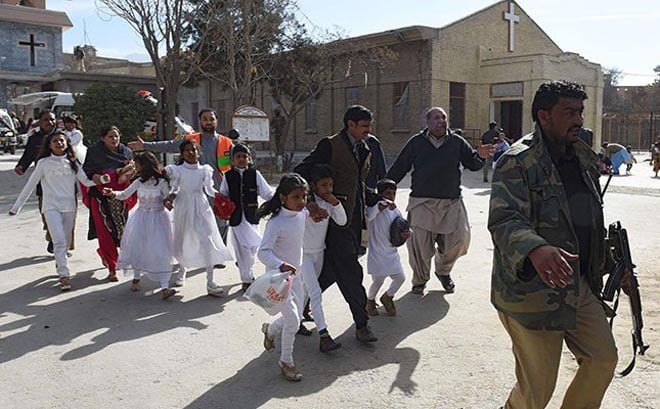
Pakistan finds itself under the spotlight after the US places it on a special watch list

On January 4, the US put Pakistan on a watch list of countries where religious freedom is under threat. The move came only days after asking Pakistan to do more or risk suspension of aid.
Religious minorities face social and legal discrimination and persecution. In December last year, a church was attacked in Quetta, killing at least nine people and injuring many. The National Commission for Human Rights recently released a report about basic human rights violations of the Kalash community in northern Pakistan.
The US state department annually designates governments that have engaged in or tolerated systematic, ongoing, and egregious violations of religious freedom as "Countries of Particular Concern (CPC)".
According to the US State Department, protection of religious freedom is vital to peace, stability, and prosperity. These designations are aimed at improving respect for religious freedom in these countries.
Pakistan has been added to a "special watch list" of governments or entities that don’t meet the requirements for the CPC designation yet but still "engage in or tolerated" severe religious freedom violations. This indicates that if the situation of religious freedom is not improved in Pakistan, the country can be added to the CPC list.
Saroop Ijaz, a lawyer and representative of Human Rights Watch (HRW) in Pakistan, says Pakistan has been placed on a "special watch list" under the International Religious Freedoms Act (IRFA) by the US. This means that the US views lack of religious freedom to be of concern.
"This exercise can eventually result in two outcomes: the first is trying to put pressure on the country to rectify the situation by "naming and shaming" and, secondly, by imposing economic sanctions," he says, adding, "Given the recent statements from the US administration on other issues, the persuasive value of both these options is considerably diminished."
"Pakistan still needs to address the freedom of religious belief for the sake of millions of its citizens and for it to realise the objective of being a modern, progressive and inclusive country," he suggests. "The situation of religious freedoms in Pakistan is extremely worrying. After the Army Public School Peshawar tragedy there was a feeling that we have turned a corner and a broad-based consensus against religious intolerance had been reached. However, sadly, some of the momentum has been lost," he observes.
According to a report of United States Commission on International Religious Freedom in 2017, Pakistani government continued to perpetrate and tolerate systematic, ongoing, and egregious religious freedom violations.
Read also: Editorial
Constitutional provisions and legislations, such as the country’s blasphemy laws, continue to result in prosecutions and imprisonments, the report highlights.
At least 40 people have been sentenced to death or are serving life sentences for blasphemy, including two Christians who received death sentences in June 2016. During the year, an Ahmadi and a Shia Muslim were convicted and imprisoned for five years, and four Ahmadis were charged under anti-Ahmadiyya provisions.
"Religious minority communities, including Christians, Hindus, Ahmadis, and Shia Muslims, also experience religiously motivated and sectarian violence from both terrorist organisations and individuals within society; the government’s longstanding failure to prevent or prosecute such violence has created a deep-rooted climate of impunity that has emboldened extremist actors. Provincial textbooks with discriminatory content against minorities remain a significant concern," reads the summery of the report.
There have been reports of forced conversions and marriage of Hindu and Christian girls from Tharparkar and elsewhere.